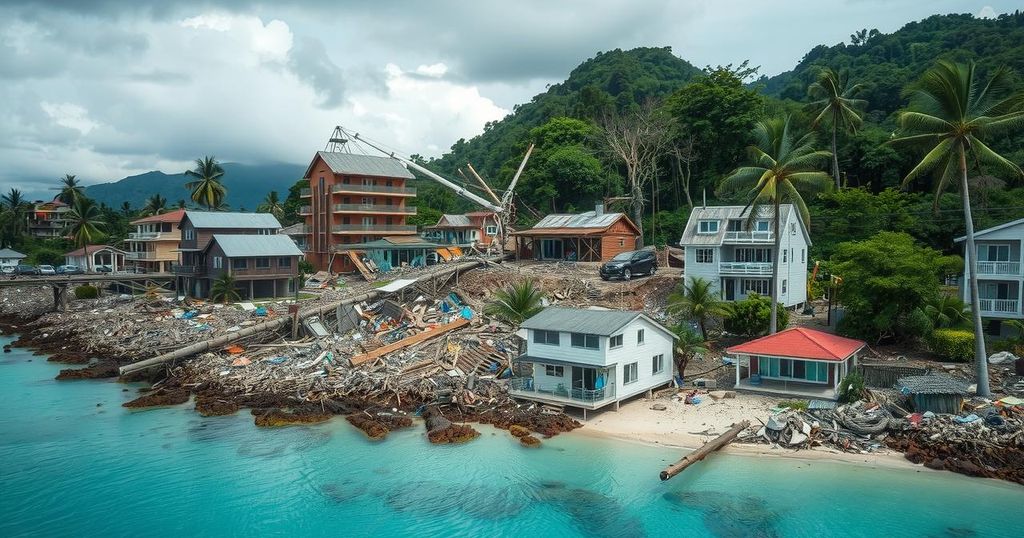Cyclone Chido and Vanuatu Earthquake: A Twin Crisis of Destruction and Urgency

Recently, Tropical Cyclone Chido caused significant devastation in Mayotte, Comoros, and Mozambique, while a 7.3-magnitude earthquake struck Vanuatu soon after. Cyclone Chido has resulted in widespread destruction, loss of life, and overwhelming health system demands. Direct Relief is actively providing emergency medical assistance and assessing needs in the affected regions, highlighting the ongoing risks to health and infrastructure posed by natural disasters.
In a weekend of unprecedented natural disasters, Tropical Cyclone Chido wreaked havoc on the Mayotte archipelago, Comoros, and Mozambique, resulting in substantial destruction and loss of life. This cataclysm was exacerbated just days later by a 7.3-magnitude earthquake in Vanuatu, an island nation already grappling with vulnerabilities. Cyclone Chido has been acknowledged as the most formidable storm to impact Mayotte in over nine decades, with wind speeds surpassing 140 miles per hour and storm surges reaching heights of 28 feet, devastating entire neighborhoods, particularly in informal migrant settlements. The confirmed fatalities in Mayotte stand at 22, although casualty figures are predicted to rise markedly as further assessments are conducted.
In the Comoros, Cyclone Chido similarly unleashed destructive winds and heavy rains, prompting President Azali Assoumani to declare a week of mourning for the casualties while noting significant infrastructural damage across the nation. Mozambique, already susceptible to severe climate events, faced the brunt of the cyclone’s force, where winds exceeding 160 miles per hour and torrential rainfall inflicted extensive damage on homes, infrastructure, and health facilities. Direct Relief is actively assessing the immediate needs of the affected communities. In Mayotte, collaboration with French emergency services aims to address urgent healthcare requirements, while in Comoros, partnership with Santé Diabète focuses on providing support and conducting needs assessments. Furthermore, Direct Relief is in communication with Mozambique’s Ministry of Health to offer medical supplies as evaluations continue.
Simultaneously, the 7.3-magnitude earthquake in Vanuatu has drawn attention, causing substantial destruction of residences and healthcare facilities, with ongoing aftershocks heightening risks. Direct Relief is coordinating with healthcare partners in Vanuatu to identify the most critical needs and expedite assistance, with emergency medicines and medical supplies en route. Natural disasters, such as earthquakes and cyclones, pose both immediate and long-term health threats, including mass casualties, injuries from trauma, infrastructure failures, and overwhelming local health systems. Additional risks include disease outbreaks from water contamination, displacement in overcrowded shelters, and disrupted access to care for chronic illnesses.
To mitigate these challenges, Direct Relief ensures essential medical supplies, ranging from trauma kits to vaccines, are delivered to frontline healthcare providers. With a long-standing commitment to disaster response, Direct Relief has effectively mobilized medical resources following events like Cyclone Idai in 2019 and the recent earthquakes in Türkiye and Syria. They have facilitated over 100 tons of medical aid to Mozambique, Zimbabwe, Malawi, and have consistently supported health sectors in Vanuatu for years, pre-positioning resources in anticipation of disasters.
As the repercussions of Cyclone Chido and the Vanuatu earthquake continue to unfold, Direct Relief remains resolutely committed to aiding healthcare providers and ensuring the provision of life-saving medical care to the most affected communities. Furthermore, public donations enhance the impact of these efforts, each contribution representing a critical part of humanitarian support in desperate times.
The region has experienced monumental natural disasters in rapid succession, revealing the vulnerabilities of specific communities already strained by socio-economic factors. Cyclone Chido swept through southeastern Africa, particularly impacting Mayotte, Comoros, and Mozambique, while a powerful earthquake struck the Pacific nation of Vanuatu. These events illustrate the increasing intensity and frequency of such disasters, necessitating robust emergency response strategies to meet the health needs of affected populations. Organizations like Direct Relief play a crucial role in providing timely medical assistance in the aftermath of such calamities, addressing both immediate healthcare needs and long-term recovery efforts.
In conclusion, the catastrophic occurrences of Tropical Cyclone Chido and the significant earthquake in Vanuatu have highlighted the critical healthcare challenges faced by impacted communities. Direct Relief’s extensive commitment to disaster response ensures that critical medical supplies and resources are delivered timely to facilitate recovery amidst these crises. As assessments and aid efforts continue, the importance of coordinated humanitarian support and individual contributions in disaster-stricken areas becomes increasingly apparent.
Original Source: www.directrelief.org








